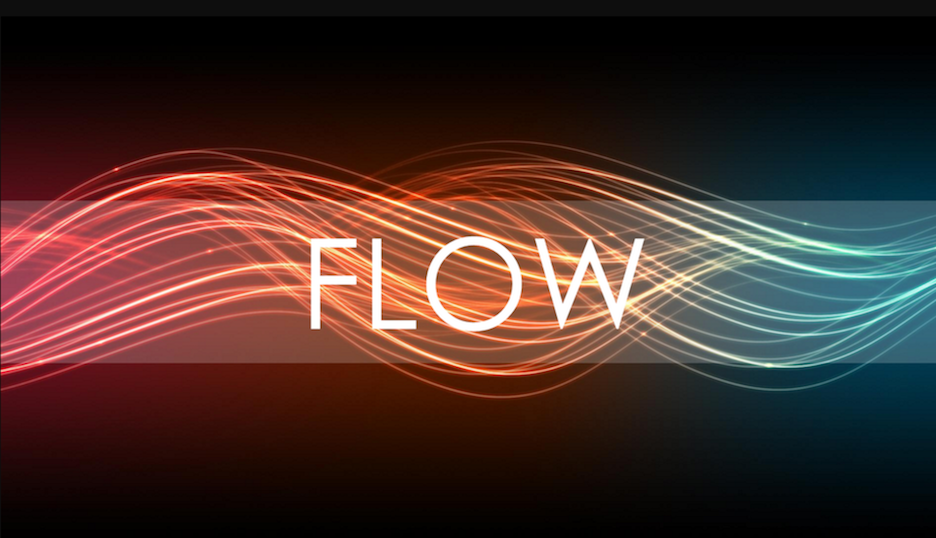
Ready for another week? Ready to go with the flow, or better yet, find yourself in the Flow?
So what do I mean by “Flow”. Do you remember the term, “Just go with the flow?” The phrase is originally credited to Roman Emperor Marcus Arelius in his writings, “The Meditations”. He came to the conclusion that most things flow naturally, thus it is better to go with the flow of nature rather than change society. Perhaps that is why his death marked the beginning of the end for the Western Roman Empire.
Today, the term “Flow” takes on a different meaning. Mihaly Csikszentmihalyi (pronounced “Checks send me high”), a Hungarian psychologist and former chair of the Psychology Department at the University of Chicago is considered to be the world’s leading researcher in the field of Positive Psychology. His book, Flow: The Psychology of Optimal Experience, originally published in 1991, (2nd edition, 2008) is considered to be the seminal piece of research in this field. Csikszentmihalyi defines Flow as, “A state in which people are so involved in an activity that nothing else seems to matter; the experience is so enjoyable that people will continue to do it, even at great cost, for the sheer sake of doing it.” He identifies eight characteristics associated with Flow:
• Complete concentration on the task
• Clarity of goals
• Transformation of time
• The experience is intrinsically rewarding
• Effortless and ease
• There is a balance between challenge and skills
• Actions and awareness are merged
• Feeling of control over tasks.
Mike Oppland, co-founder and co-director of xpertcoaching.com presents a very comprehensive overview of Flow in his post, “Mihaly Csikszentmihalyi : All About Flow & Positive Psychology”. It’s a great read and includes Csikszentmihalyi’s presentation at TED. Now here is my question for you, Do you find Flow in what you do everyday? Did you ever think of your work or career from this perspective? Let’s consider it from another perspective; How can we create working environments that foster Flow?
Steven Kotler, author of The Rise of Superman: Decoding the Science of Ultimate Human Performance answers this question in his HBR post, “Create a Work Environment that Fosters Flow”. He begins by considering a ten year study conducted by McKinsey and Company that reveals top executives reporting being five times more productive in Flow. Those same researcher predicted that if we could increase workplace Flow by 15-20%, overall workplace productivity would almost double. How is it done? According to Kotler, one of the psychological triggers is the challenge/skills ratio. Our attention is most engaged at an optimal relationship between challenge and stress. Too much challenge and fear swamps the system. If the challenge is too easy, we become bored. Flow appears at the emotional midpoint. Daniel Goleman in his You Tube Video, “Focus, Flow and Frazzle”, does an excellent job illustrating this relationship between Stress and Performance.
OK, so your answer was, “Nope, not experiencing Flow currently, so what now?” Not to worry, you are simply still on your journey in search of your “Element”. Remember Sir Ken Robinson? I mentioned him in the March 29 newsletter on Positive Leadership. Robinson wrote the NY Times Best Seller, The Element: How Finding Your Passion Changes Everything” . He writes, “The Element” is the point at which natural talent meets personal passion. When people arrive at the Element, they feel most themselves and most inspired and achieve at their highest levels.”
Some of us are lucky to find our first element early in our working days. We arrive prematurely at that point where our natural talent meets our passion and all seems well. For others, the journey is longer and often filled with frustration because they seek a final destination. However the reality is we never really arrive. As we get older and gather life experiences, our skills and passions change as does the meeting point. As you continue to learn and gather experience you will continue your journey eventually finding another element and a new “zone”.
When I retired I remember being asked to reflect on the lessons I had learned along the way. There were many, but I remember responding that there was something more important; I had discovered what success and happiness were at age 65. I wonder what it will be at 75?
Embrace the Challenge and have a great week!
